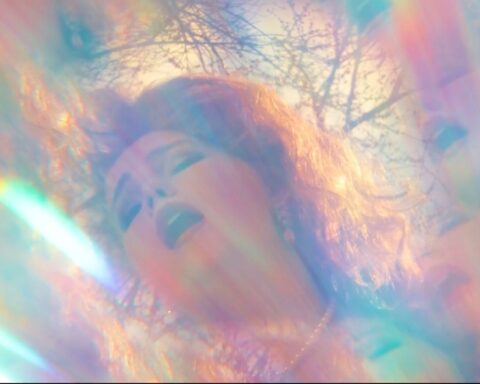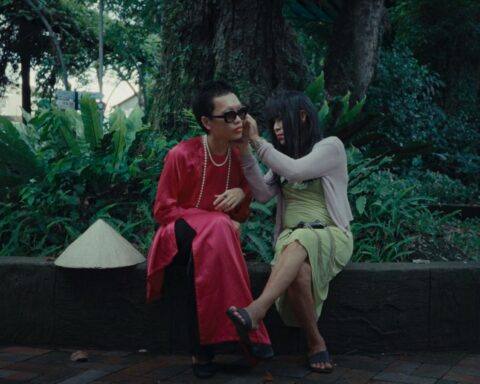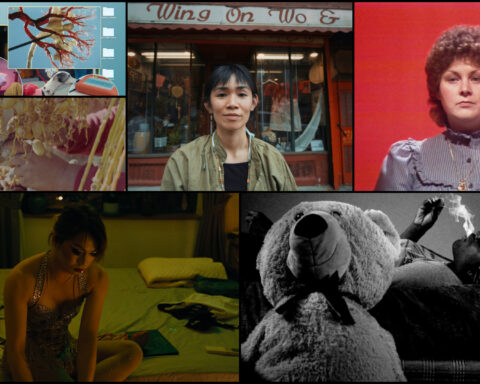“2012 might be the last DOXA Documentary Film Festival.”
DOXA programming director Dorothy Woodend bomb-dropped by email after we met to discuss this year’s slate. I scrambled to find out why. Dwindling audiences? Funding problems? Too many theatres affected by the BC liquor law fiasco?
Though a couple weeks later I’d learn about the Canadian Heritage ministry’s funding scare (see sidebar), that wasn’t what Woodend was referring to at the time.
“We’re actually thinking about changing our name in order to accommodate the scope and breadth of new forms of documentary presentation, so it wouldn’t be DOXA Documentary Film Festival, it would be DOXA Documentary Festival. No worries about us vanishing; we’re just planning for the big bold future!” she explains in her next, less coronary-inducing email.
The potential name change makes sense when I consider the documentary they’ve chosen to open the festival on May 4th: Bear 71, an interactive experience that incorporates live surveillance of viewers as they watch what happened to a grizzly bear in captivity. The tragic story is told through a combination of traditionally filmed footage, computer graphics, the haunting music of Radiohead, Sigur Ros and others, and the dry voice of Canadian actress Mia Kirshner. The NFB-produced documentary premiered at the Sundance Film Festival in January and has its homecoming at DOXA, since the NFB’s digital studio is located in Vancouver. After DOXA, Bear 71 goes on to the London Film Festival in the fall, so Vancouver will be its sole Canadian stop.
What makes Bear 71 groundbreaking is that it was designed as a website. But film festivals can screen it live, with just about everyone but the bear re-enacting their roles. DOXA will mount Bear 71 as a live event in St. Andrew’s Wesley United Church in downtown Vancouver, further bringing the festival out of the theatrical ghetto and to what Woodend hopes will be new audiences. While not confirmed yet, it’s hoped that one of the creators of the documentary will walk the audience through the filmed footage, Kirshner will narrate the bear’s thoughts, Tim Hecker and other artists whose music is featured in the documentary will play along, and the sound will be mixed by the same designer who put together the website, Josh Stevenson. The audience should be able to watch themselves, as always with this work, on monitors inside the church.
Just as Bear 71 stretches into online and interactive territory, so does the rest of DOXA. That may not be a coincidence, given how fast the documentary world is evolving. In making their 100 selections for this year’s festival, Woodend and her team found themselves inundated with opportunities to pre-screen documentaries online. Last year there was one documentary online service offering professional viewers 500 titles curated from around the globe.This year there are seven such services, for a grand total of over 3,000 titles. And these are carefully curated selections, not just random ones. Independent (read: random) submissions have also jumped from around 1,000 in 2011 to 1,300 this year, and Woodend says they’re increasingly coming in the form of Vimeo links instead of DVDs. Woodend may need to truncate more than just the title of the festival next year if she doesn’t want to have a coronary herself.
Indeed, Woodend seems to be enjoying the new possibilities too much to put limits on the process. In just her second year as programming director, Woodend is working with the DOXA team to push the festival toward greater social and artistic interactivity. Let’s follow that idea down all the different avenues at DOXA 2012.
The festival’s Rated Y for Youth school outreach forum is in its fourth year and serves as a model of targeted inclusion and interactivity for the festival. Six school districts are loaning out their secondary students for screenings that take place Monday through Friday at noon. Post-film discussions with filmmakers and community members aim to give the students media literacy, but they’re also a great way to explore the issues in the documentaries, like meat production and consumption in LoveMEATender and Murder Mouth, life in Iraq as seen through the eyes of a women’s basketball team in Salaam Dunk, and the concentration of power via capitalism in Four Horsemen. The local theatre group Miscellaneous Productions Society is going one step further by bringing the young East Vancouver subjects of their documentary Stock Characters: The Cooking Show to the screening. With any luck, the resulting Q&A will pull the young audience inside the experience of making the film as well as start a dialogue among peers of different races and backgrounds.
Programming for adults is quickly catching up to that level of community involvement. According to Woodend, audience participation at DOXA tends to peak during the Justice Forum, a series of films dealing with the struggle for legal fair play and human rights. The forum was introduced in 2010 and expanded in 2011 when BC’s Law Foundation and Immigrant Services Society were invited as sponsors. The forum’s mandate of providing “a space for open discussion between community activists, filmmakers, legal scholars and DOXA audience members” got viewers talking so much last year that they had to be ushered out of the lobby to make way for the next screening. Woodend was impressed with the elevated quality of these discussions, something she credits to the emotional and challenging nature of the films. But audience participation isn’t always refined.
A week before the Tears of Gaza screening last year, Woodend received an inflammatory and degrading email from a pro-Israel viewer who tracked her down via her personal Facebook page. Undaunted, this year Woodend plans to show 5 Broken Cameras, a documentary about the violence Palestinian farmers and their camera-wielding supporters suffer at the hands of Israeli settlers, and The Law in These Parts, a look at the military legal system Israel imposes in the Occupied Territories. DOXA also proudly showcases the work of acclaimed Israeli filmmakers; this year David Fisher’s intimate Holocaust memoir Six Million and One gets the spotlight. Other titles in the forum include Big Boys Gone Bananas!*, Swedish filmmaker Fredrik Gertten’s incredulous look at how Dole went after him after he made a documentary about Nicaraguan plantation workers who sued the company, and Sex Crimes Unit and You Have the Right to an Attorney, two films about the people working for justice for the vulnerable and disenfranchised in New York City.
After last year, Woodend decided it was a shame audiences could only stand around in lobbies chatting about the films. So DOXA is partnering this year with The Philosopher’s Café, a public discussion group run through Simon Fraser University’s Continuing Studies department, to offer a series of “cafés” where audiences can meet more formally and comfortably to debate issues raised in the documentaries. After watching the films, participants will walk over to nearby Subeez restaurant, a longtime DOXA sponsor, and sit at picnicstyle tables, noshing and hashing out their thoughts on films organized around four hotbutton topics: documentary ethics (The Patron Saints), home movies (Six Million and One, Mine Mine), right-to-die and death-penalty issues (An Encounter with Simone Weil) and drugs (The Substance: Albert Hofmann’s LSD). Audience participation isn’t just encouraged, it’s expected and nurtured at these events.
A new DOXA forum tackles the very subject of social engagement: Catching Fire, a series of documentaries about direct-action campaigns around the world. Some of the films are urgent and up-to-the-minute, like Tahrir 2011: The Good, the Bad, and the Politician, an on-the-ground report from last year’s uprising in Cairo’s Tahrir Square. Tahrir 2011 was chosen over other, equally good documentaries on the Arab Spring because Woodend feels it gets at the physical experience of protest in riveting detail, from how to break up paving stones to make rocks to the way protesters insert bits of cardboard into their bandanas to cushion blows.
Woodend also felt it would be useful to give today’s campaigns historical context, so she went into the vault and pulled out gold in the form of King: A Filmed record…Montgomery to Memphis, Sidney Lumet’s 1970 documentary about Martin Luther King Jr.’s civil rights marches. The Oscar-nominated film hasn’t been shown in a theatre in over 40 years, so Woodend expects the DOXA screening will be a hot ticket. She also finds interesting parallels between today’s occupy Wall Street tents and the women who set up an anti-nuclear protest encampment on an air-force base in Berkshire, U.K., from 1982 to 2000. Their efforts are featured in the 1983 documentary Carry Greenham Home.
From there, Catching Fire lights up around the lives and work of Gene Sharp (How to Start a Revolution, directed by Ruaridh Arrow) and AIDS activist Vito Russo (Jeffrey Schwarz’s Vito). If something more than polite discussions in cafés gets inspired by these screenings, that’s just fine by Woodend, but she says the goal of the forum is to help viewers notice repetitions in history and consider the importance of collectivity in making change happen.
But enough about this lofty project of social engagement. There are two other forums at this year’s festival that engage with filmmakers and thinkers in more traditional ways.
Making Waves is an all-day forum celebrating women filmmakers who’ve brought their work to the festival more than once. Pia Massie will be returning to present the world premiere of Just Beyond Hope, an experimental documentary telling the stories of women in Japanese internment camps, while Rosie Dransfeld offers Who Cares?, a freshly filmed study of the sex trade and its grim realities in Edmonton. Leanne Allison will be at the Roundhouse Community Centre introducing an interactive installation of Bear 71, which she co-directed. And Brishkay Ahmed will host a gala screening of her new documentary, The Story of the Burqa. In addition, there will be a panel discussion on women filmmakers navigating the brave new world of web docs.
One DOXA forum that’s less interactive than others is the Guest Curator series. This year the philosopher Mark Kingwell, filmmaker Astra Taylor and writer David Shields were invited to choose documentaries past and present that speak to them, and then write up statements to be included in the festival program guide. However, the curators aren’t actually expected to attend the festival as guests and engage with audiences in person. Woodend believes their essays stand as “curatorial statements” that have their own literary merit and address the larger issues raised in the films, such as neotribalism in the case of Kingwell’s three short docs (American Juggalo, Heavy Metal Parking Lot, and Terminal Bar) and direct action in the case of Taylor’s introduction to the Catching Fire series. It seems odd nonetheless that a festival so geared toward getting everyone together and talking has one forum in which three thinkers simply send in missives from on high.











